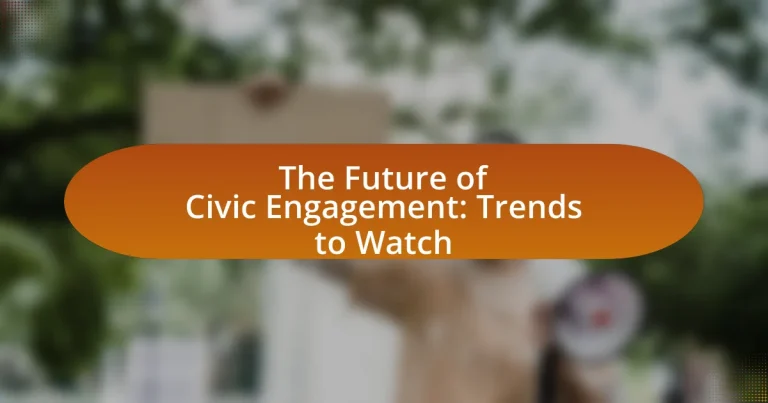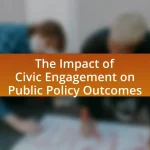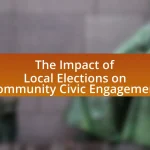The article examines the future of civic engagement, highlighting how digital technology and social media are transforming participation and activism among citizens. It discusses the evolution of civic engagement in the digital age, emphasizing the role of social media platforms, online petitions, and campaigns in increasing accessibility and mobilization. Key trends shaping this future include a focus on inclusivity, the impact of demographic shifts, and the challenges posed by misinformation and political polarization. The article also explores the importance of civic engagement for democracy, its influence on policy-making and community development, and practical steps individuals can take to enhance their involvement.
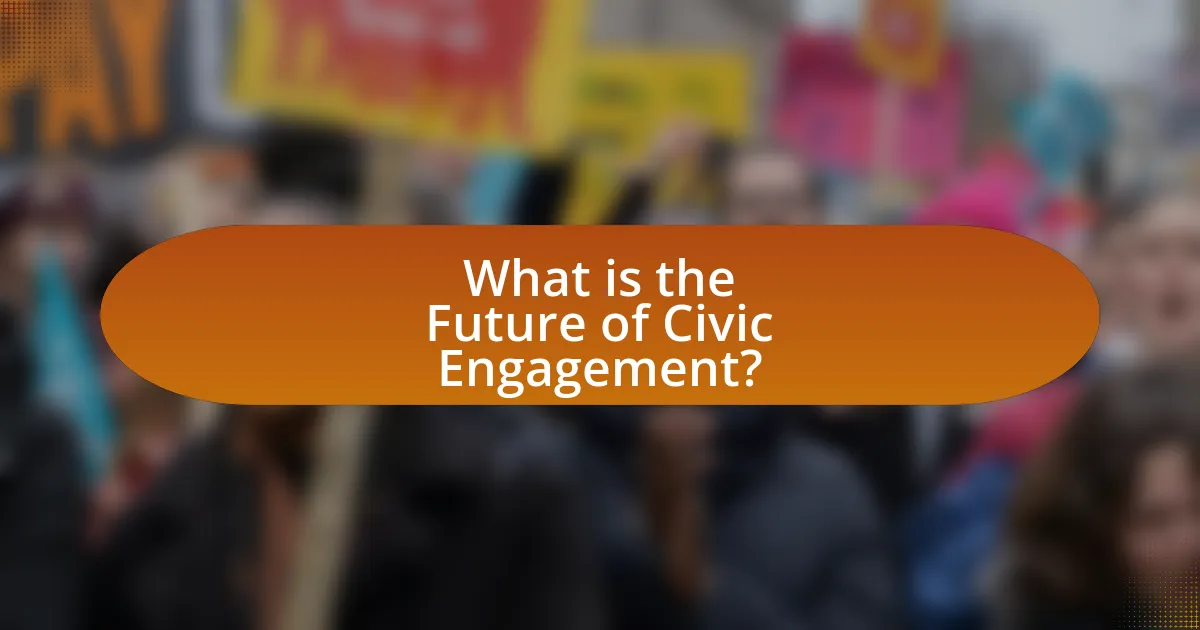
What is the Future of Civic Engagement?
The future of civic engagement is increasingly shaped by digital technology and social media, which facilitate greater participation and mobilization among citizens. As evidenced by the rise of online platforms for activism and community organizing, such as Change.org and social media campaigns like #BlackLivesMatter, technology enables individuals to connect, share information, and advocate for change more efficiently than ever before. Additionally, data from the Pew Research Center indicates that younger generations are more likely to engage in civic activities online, suggesting a shift in how civic engagement is defined and practiced. This trend points to a future where civic engagement is more inclusive, diverse, and responsive to the needs of communities.
How is civic engagement evolving in the digital age?
Civic engagement is evolving in the digital age through increased accessibility, enhanced communication, and the rise of social media platforms. Digital tools enable broader participation by allowing individuals to engage in discussions, share information, and mobilize for causes from anywhere in the world. For instance, a 2020 study by the Pew Research Center found that 53% of Americans reported using social media to engage with political issues, highlighting the significant role these platforms play in shaping public discourse and activism. Additionally, online petitions and crowdfunding for social causes have become more prevalent, demonstrating how technology facilitates collective action and community organizing.
What role do social media platforms play in civic engagement?
Social media platforms play a crucial role in enhancing civic engagement by facilitating communication, mobilizing communities, and providing a space for public discourse. These platforms enable individuals to share information, organize events, and advocate for social issues, significantly increasing participation in civic activities. For instance, a study by the Pew Research Center found that 69% of adults in the U.S. use social media, and among these users, 53% have engaged in civic activities such as attending a political rally or contacting an elected official as a result of social media interactions. This demonstrates that social media not only serves as a tool for information dissemination but also actively encourages civic participation and community involvement.
How are online petitions and campaigns changing participation?
Online petitions and campaigns are significantly increasing civic participation by providing accessible platforms for individuals to express their opinions and mobilize support. These digital tools enable users to easily create, share, and sign petitions, which can lead to rapid grassroots movements. For instance, a study by the Pew Research Center found that 70% of Americans have engaged in some form of online activism, demonstrating a shift from traditional methods of participation to digital engagement. This shift allows for broader demographic involvement, as people can participate from anywhere, reducing barriers such as geographic location and time constraints.
Why is civic engagement important for democracy?
Civic engagement is crucial for democracy because it fosters active participation of citizens in political processes, ensuring that government reflects the will of the people. When individuals engage in civic activities such as voting, attending town hall meetings, or participating in community organizations, they contribute to a more informed electorate and hold elected officials accountable. Research indicates that higher levels of civic engagement correlate with increased voter turnout and more responsive governance, as seen in studies by the Pew Research Center, which found that engaged citizens are more likely to advocate for policies that align with their community’s needs. This active participation strengthens democratic institutions and promotes social cohesion, ultimately leading to a healthier democracy.
What impact does civic engagement have on policy-making?
Civic engagement significantly influences policy-making by fostering public participation and ensuring that diverse voices are heard in the decision-making process. Engaged citizens can advocate for specific issues, leading to policies that reflect community needs and priorities. For instance, research by the National Civic League indicates that communities with higher levels of civic engagement tend to have more responsive local governments and policies that better address the concerns of residents. This correlation demonstrates that active participation not only enhances democratic processes but also results in more effective and equitable policy outcomes.
How does civic engagement influence community development?
Civic engagement significantly influences community development by fostering collaboration among residents, which leads to improved social cohesion and resource allocation. When individuals actively participate in civic activities, such as town hall meetings or volunteer initiatives, they contribute to a shared vision for their community, enhancing trust and communication among diverse groups. Research indicates that communities with higher levels of civic engagement experience better outcomes in areas such as public safety, education, and economic development, as evidenced by a study from the National Civic League, which found that engaged communities are more likely to implement successful local policies and programs.
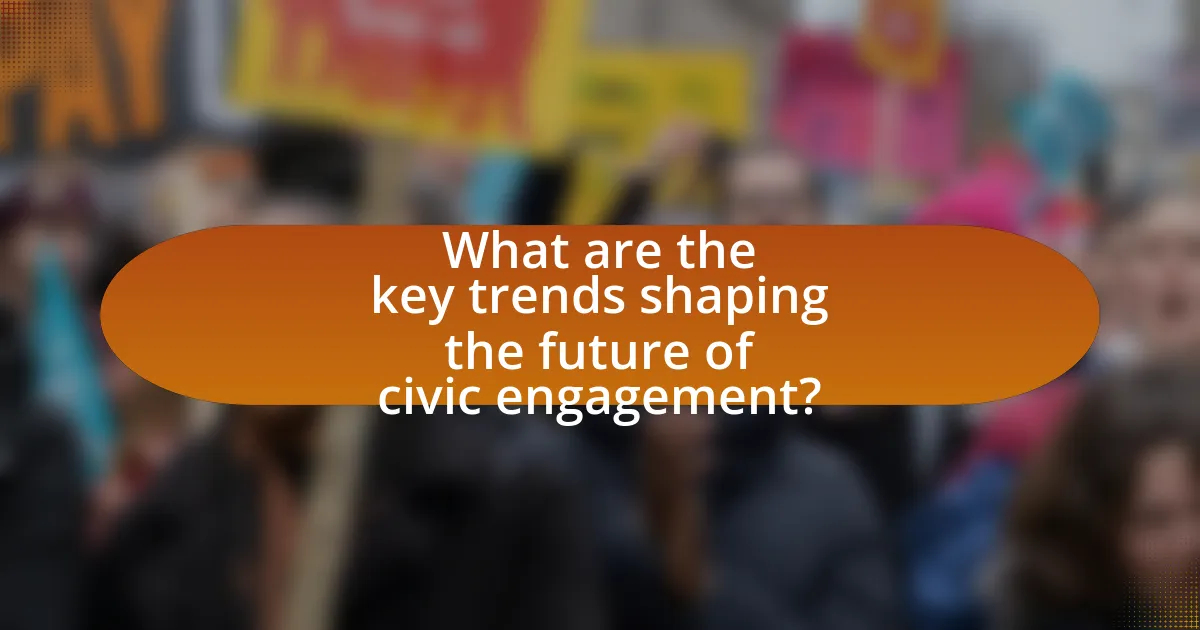
What are the key trends shaping the future of civic engagement?
Key trends shaping the future of civic engagement include the rise of digital platforms, increased focus on inclusivity, and the integration of data analytics. Digital platforms, such as social media and mobile applications, facilitate real-time communication and mobilization, allowing citizens to engage more easily with civic issues. Research from the Pew Research Center indicates that 69% of Americans use social media to connect with others about political issues, highlighting the importance of these platforms in modern civic engagement.
Inclusivity is increasingly prioritized, with movements advocating for the representation of marginalized communities in decision-making processes. A report by the National Civic League emphasizes that inclusive practices lead to more equitable outcomes in civic participation.
Additionally, the use of data analytics enables organizations to better understand community needs and tailor engagement strategies accordingly. For instance, data-driven approaches can identify trends in public sentiment, allowing civic leaders to respond effectively. These trends collectively indicate a transformative shift in how civic engagement is approached and executed in contemporary society.
How are technology and innovation driving civic engagement?
Technology and innovation are driving civic engagement by facilitating communication, enhancing access to information, and enabling participation in democratic processes. Digital platforms, such as social media and mobile applications, allow citizens to connect with each other and with their representatives, fostering a more informed and active electorate. For instance, a study by the Pew Research Center found that 69% of adults in the U.S. use social media, which has become a vital tool for organizing movements and mobilizing voters. Additionally, innovations like online voting and civic tech applications streamline participation in elections and local governance, making it easier for individuals to engage with civic issues. These advancements not only increase voter turnout but also empower marginalized communities by providing them with tools to voice their concerns and influence policy decisions.
What technologies are most influential in enhancing civic participation?
Digital platforms, social media, and mobile applications are the most influential technologies in enhancing civic participation. Digital platforms like Change.org and CitizenLab facilitate petitions and community engagement, allowing citizens to voice their opinions and mobilize support for various causes. Social media platforms, such as Facebook and Twitter, enable real-time communication and information sharing, fostering community discussions and increasing awareness of civic issues. Mobile applications, including voting apps and civic engagement tools, provide users with easy access to information about local governance, voting procedures, and community events, thereby encouraging participation in democratic processes. According to a 2020 study by the Pew Research Center, 69% of Americans believe social media is an effective tool for civic engagement, highlighting its significant role in modern democratic participation.
How can data analytics improve civic engagement strategies?
Data analytics can significantly enhance civic engagement strategies by providing insights into community needs and preferences. By analyzing demographic data, social media interactions, and survey responses, civic organizations can tailor their outreach efforts to resonate with specific populations. For instance, a study by the Pew Research Center found that targeted communication based on data analytics can increase participation in local elections by up to 20%. This demonstrates that leveraging data analytics not only informs strategy but also drives measurable improvements in civic participation.
What demographic shifts are affecting civic engagement?
Demographic shifts such as aging populations, increasing racial and ethnic diversity, and urbanization are significantly affecting civic engagement. For instance, as the population ages, older adults tend to participate more in civic activities, while younger generations, particularly Millennials and Gen Z, are more inclined to engage through digital platforms rather than traditional methods. Additionally, the growing diversity in racial and ethnic backgrounds influences civic participation patterns, as different groups may have varying levels of engagement based on cultural factors and historical contexts. According to the U.S. Census Bureau, by 2045, the U.S. is projected to become a majority-minority nation, which will likely reshape civic priorities and engagement strategies to reflect the interests of a more diverse populace.
How are younger generations redefining civic participation?
Younger generations are redefining civic participation through increased use of digital platforms and social media for activism and engagement. This shift is evidenced by the rise of movements like Black Lives Matter and climate activism, where young people mobilize quickly online, demonstrating their ability to influence public discourse and policy. According to a 2021 report by the Pew Research Center, 70% of young adults have engaged in civic activities online, showcasing their preference for digital engagement over traditional methods. This trend indicates a significant transformation in how civic participation is conceptualized and executed, emphasizing accessibility and immediacy in advocacy efforts.
What role do marginalized communities play in shaping civic engagement trends?
Marginalized communities play a crucial role in shaping civic engagement trends by advocating for social justice and influencing policy changes. Their active participation often highlights systemic inequalities, prompting broader societal discussions and reforms. For instance, the Black Lives Matter movement, which emerged from marginalized communities, has significantly impacted civic engagement by mobilizing individuals across various demographics to address issues of racial injustice and police reform. This movement has led to increased voter registration efforts and participation in local elections, demonstrating how marginalized voices can drive civic action and reshape political landscapes.
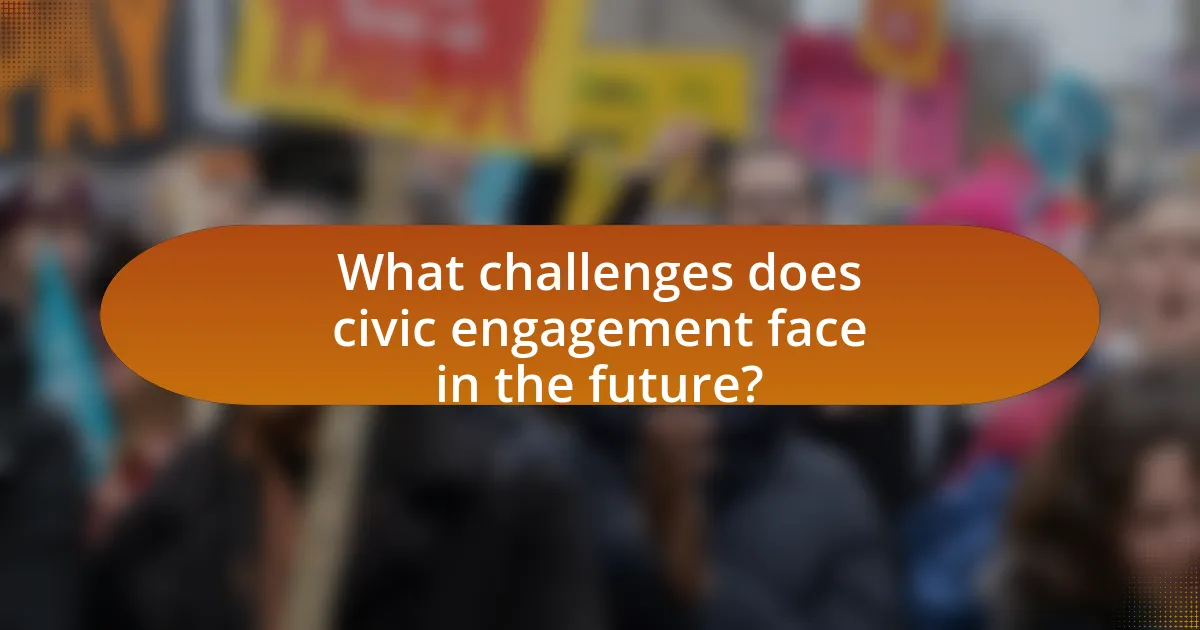
What challenges does civic engagement face in the future?
Civic engagement faces significant challenges in the future, primarily due to increasing political polarization and the rise of misinformation. Political polarization has been documented in studies, such as the Pew Research Center’s 2020 report, which indicates that Americans are more divided along partisan lines than in previous decades, leading to decreased willingness to engage with opposing viewpoints. Additionally, the proliferation of misinformation, particularly on social media platforms, complicates informed civic participation, as evidenced by a 2021 study from the MIT Media Lab, which found that false information spreads six times faster than true information. These factors hinder constructive dialogue and diminish trust in democratic processes, posing substantial obstacles to effective civic engagement moving forward.
How do misinformation and polarization impact civic engagement?
Misinformation and polarization significantly diminish civic engagement by creating distrust in institutions and fostering divisive narratives. Research indicates that exposure to misinformation can lead individuals to disengage from civic activities, as they become skeptical of the information presented by authorities and media. For instance, a study by the Pew Research Center found that 64% of Americans believe misinformation has a major impact on their ability to engage in political discussions. Additionally, polarization exacerbates this issue by reinforcing echo chambers, where individuals only interact with like-minded peers, further isolating them from diverse viewpoints and civic participation. This cycle of misinformation and polarization ultimately undermines democratic processes and civic responsibility.
What strategies can combat misinformation in civic discourse?
To combat misinformation in civic discourse, implementing fact-checking initiatives is essential. Fact-checking organizations, such as PolitiFact and FactCheck.org, provide verified information that counters false claims, thereby enhancing public understanding. Additionally, promoting media literacy programs equips individuals with the skills to critically evaluate sources and discern credible information from misinformation. Research indicates that media literacy can significantly reduce susceptibility to false information, as shown in studies conducted by the Stanford History Education Group. Furthermore, fostering open dialogue and encouraging diverse viewpoints can create a more informed citizenry, as engagement with differing perspectives often leads to a deeper understanding of complex issues.
How does political polarization affect community involvement?
Political polarization negatively affects community involvement by creating divisions that discourage collaboration among individuals with differing political views. Research indicates that heightened polarization leads to decreased participation in community activities, as individuals may feel alienated or unwilling to engage with those who hold opposing beliefs. For instance, a study published in the American Political Science Review found that communities with high levels of political polarization experience lower rates of volunteerism and civic participation, as individuals prioritize political alignment over communal goals. This trend undermines social cohesion and limits the effectiveness of community initiatives aimed at addressing local issues.
What barriers exist for effective civic engagement?
Barriers for effective civic engagement include lack of access to information, socioeconomic disparities, and political disenfranchisement. Lack of access to information limits individuals’ ability to participate meaningfully in civic activities, as they may not be aware of issues or opportunities for involvement. Socioeconomic disparities create unequal opportunities for engagement, with marginalized communities often facing obstacles such as time constraints and financial limitations that hinder participation. Political disenfranchisement, including voter suppression tactics and gerrymandering, further alienates citizens from the civic process, reducing their ability to influence decision-making. These barriers collectively undermine the effectiveness of civic engagement efforts.
How can accessibility issues be addressed in civic participation?
Accessibility issues in civic participation can be addressed by implementing inclusive policies and utilizing technology to enhance engagement. Inclusive policies should ensure that all public spaces, voting locations, and civic events are physically accessible to individuals with disabilities, as mandated by the Americans with Disabilities Act (ADA). Additionally, technology can facilitate participation through online platforms that provide information in accessible formats, such as screen reader compatibility and sign language interpretation. Research indicates that jurisdictions that adopt these measures see increased voter turnout among people with disabilities, highlighting the effectiveness of accessibility initiatives in fostering civic engagement.
What role does education play in overcoming civic engagement barriers?
Education plays a crucial role in overcoming civic engagement barriers by equipping individuals with the knowledge and skills necessary to participate effectively in democratic processes. It fosters critical thinking, enhances awareness of civic rights and responsibilities, and promotes understanding of governmental structures and functions. Research indicates that higher levels of education correlate with increased voter turnout and civic participation; for instance, the U.S. Census Bureau reported that in the 2020 election, 79% of individuals with a bachelor’s degree voted, compared to only 48% of those without a high school diploma. This demonstrates that education not only informs citizens but also empowers them to engage actively in their communities and influence policy decisions.
What practical steps can individuals take to enhance civic engagement?
Individuals can enhance civic engagement by actively participating in local governance, such as attending town hall meetings and engaging with elected officials. This participation fosters a direct connection between citizens and their representatives, allowing for the expression of community concerns and priorities. Research indicates that communities with higher attendance at local meetings experience more responsive governance and increased civic trust. Additionally, volunteering for local organizations or initiatives can strengthen community ties and promote collective action, further enhancing civic involvement.
